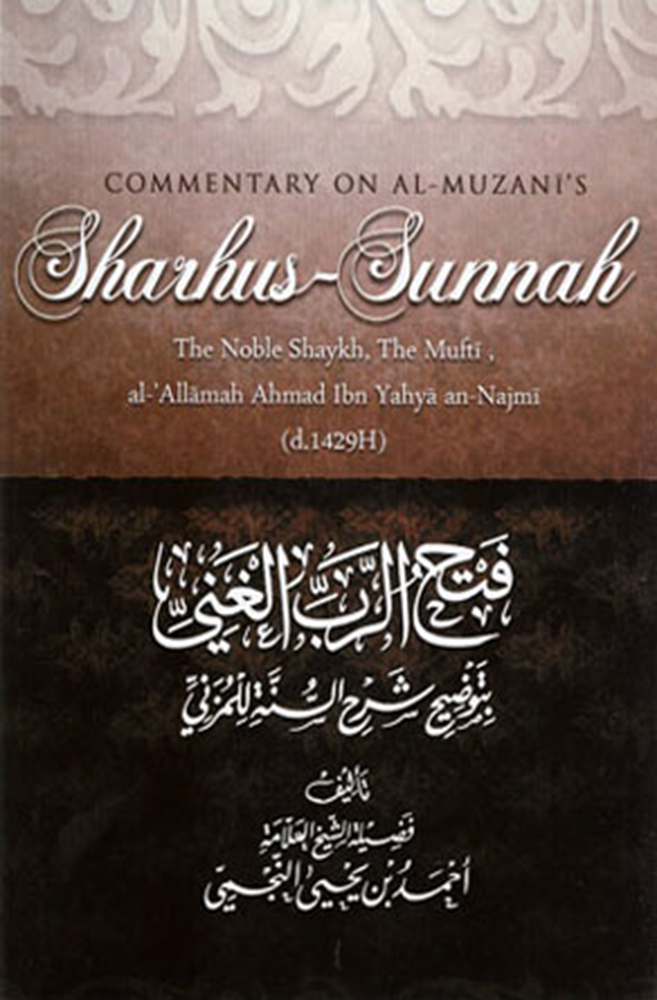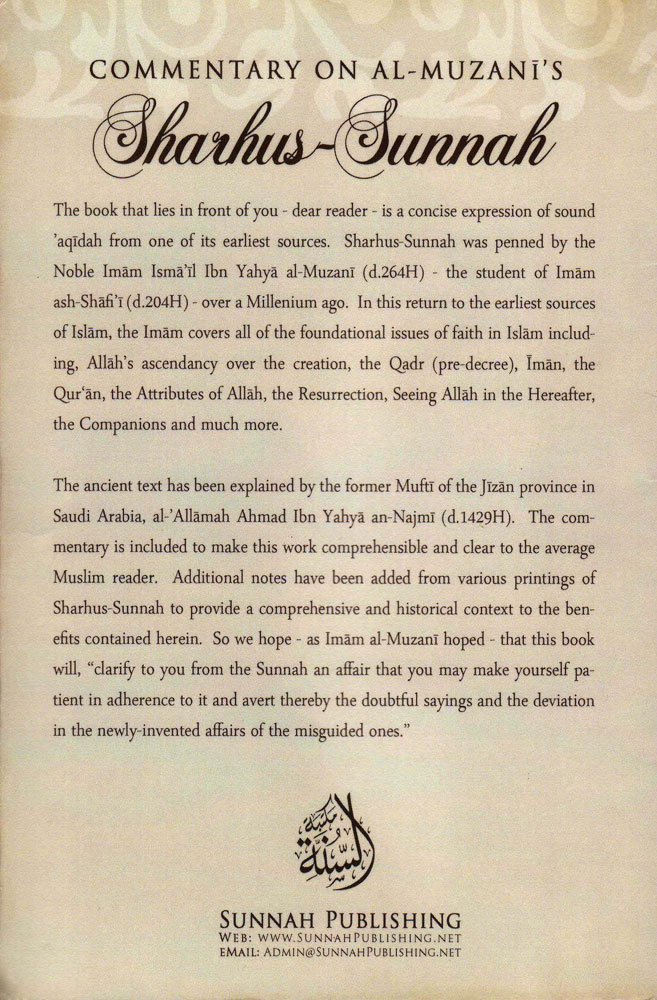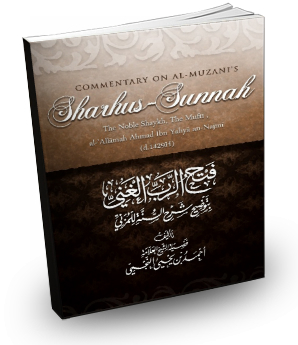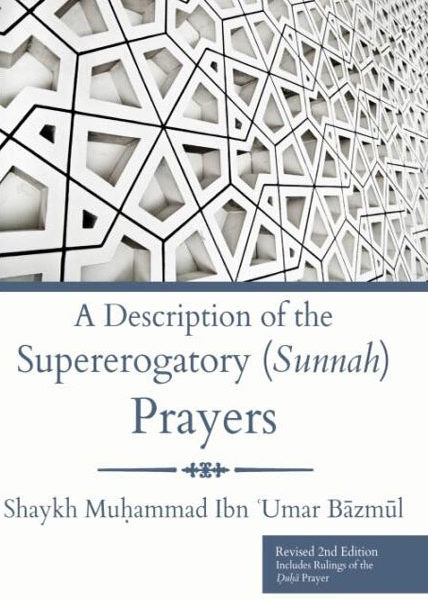By: Shaykh Aḥmad ibn Yaḥyá al-Najmī
The book that lies in front of you – dear reader – is a concise expression of sound ‘aqidah from one of its earliest sources. Sharhus-Sunnah was penned by the Noble Imam Isma’il Ibn Yahya al-Muzani (d.264H) – the student of Imam ash-Shafi’i (d.204H) – over a Millenium ago. In this return to the earliest sourecs of Islam, the Imam covers all of the foundational issues of faith in Islam including, Allah’s ascendency over the creation, the Qadr (pre-decree), Iman, the Qur’an, the Attributes of Allah, the Resurrection, Seeing Allah in the Hereafter, the Companions and much more.
The ancient text has been explained by the former Mufti of Jizan province in Saudi Arabia, al-‘Allamah Ahmad Ibn Yahya an-Najmi (d.1429H). The commentary is included to make this work comprehensible and clear to the average Muslim reader. Additional notes have been added from various printings of Sharhus-Sunnah to provide a comprehensive and historical context to the benefits contained herein. So we hope – as Imam al-Muzani hoped – that this book will, “clarify to you from the Sunnah an affair that you may make yourself patient in adherence to it and avert thereby the doubtful sayings and the deviation in the newly-invented affairs of the misguided ones.”
The Angels
He created the creation with His Will, without any need for the creation. So He created all of the Angels for His obedience and He made them naturally inclined towards His worship. So from them are Angels who carry the Throne by His Power. And there is a group from amongst them who surround the Throne glorifying Him. And there are others who praise and venerate Him. And He chose Messengers from amongst them and some of them carry out His command.1
Explanation:
Belief in the angels is a pillar from amongst the pillars of iman (faith), just as iman in the Qadr is a pillar from amongst the pillars of iman.
So the Angels – as the author of the text (rahimahullah) has described; Allah (Azza wa Jal) created them and all of the creation without any need for them. However, He created them for a wisdom and He brought them into existence for an objective that He (Subhaanahu wa ta’aala) wanted from them. So all of the Angels are naturally inclined to obey Him (Jalla wa ala). They do not disobey Him for the blink of an eye. From them are the carriers of the Throne and from them are the Arch-Angels who surround the Throne.
Allah (Azza wa Jal) said,
“Those Angels who carry the Throne and those around it exalt Allah with praise of their Lord and believe in Him and ask forgiveness for those who have believed.” [Surah Ghafir 40:7]
And from them are Angels whom Allah has made into Messengers whom He commands with His command and they execute it. And from are the guardians and from them are the punishers and from them are the treasurers of profit and from are the safekeepers of the Fire and from them are the treasurers of Paradise. And from them are the Angels of the seas and from them are the Angels of the mountains and from them are the Angels who are entrusted with the clouds and from them are the Angels of the heavens worshipping Allah.
The Prophet (صلى الله عليه وسلم) said, “The heavens creaked and they had a right to creak. There was not a single place therein the space of four fingers, except that an Angel was placing its forehead there in prostration to Allah.”2
Footnotes
1 Shaykh ‘Ubayd al-Jabiri (hafidhahullah) said, “He mentioned iman in the Angels and that Allah created the Angels for His obedience. There is no disobedience amongst them. Indeed, Allah described them as honourable servants. They do not precede Him in statement and they carry out His commands and they have duties. So it is obligatory to have iman in the Angels – those whom Allah has named from amongst them and those whom He has not named, such as Jibril, Mika’il and Israfil. Likewise, Malik has been named as the keeper of the Fire and Ridwan is the keeper of Paradise. And they have specific duties, from them is the trustworthy spirit: Jibril (alaihis-salaam). Likewise, the author – rahimahullah – mentioned that they have duties, which Allah has entrusted them with. So they answer and obey (alaihimus-salaam). And from these Angels are the ones who carry the Throne, and Allah has granted them the ability to carry it.” Refer to the first casette of Shaykh ‘Ubayd’s lessons on Sharhus-Sunnah of al-Muzani.
2 Sahih: Related by Ahmad (no. 21516), at-Tirmidhi (no. 2312), Ibn Majah (no. 4190), al-Bazzar (no. 3524), at-Tahawi in Mushkilul-Athar (no. 1135), al-Baghawi in Sharhus-Sunnah (no. 4172) and al-Hakim (2/510), from the hadith of Abi Dharr (رضي الله عنه). It was authenticated by al-Albani in Sahihul-Jami’ (no. 1020).
Benefit: There are also other than the types of Angels that have been mentioned here. There are the Angels who are entrusted with questioning the dead person. When he is placed in his grave, there come to him two Angels who ask him about his Lord, his Religion and his Prophet. And there is the Angel of death who is entrusted with seizing the souls at the time of death. And there are the Angels who attend the gatherings of dhikr (remembrance). And there are the Angels who are entrusted with the fetuses in the wombs. When the person reaches the fourth month in the stomach of his mother, Allah sends to him an Angel who writes down his sustenance, his lifespan, whether he will be wretched or happy, and much more than that.
Indeed, some of the names of the Angels have been mentioned such as Jibril, Mika’il, Israfil and Malik the keeper of the Fire. Likewise, there is an Angel who transforms into the form of a man by the command of Allah (tabaaraka wa ta’aala), as occurred with Jibril when Allah (tabaaraka wa ta’aala) sent him to Maryam (aliahas-salaam). So he came to her in the form of a human being of regular build. And he came to the Prophet (صلى الله عليه وسلم) whilst he was sitting with his Companions in the form of a man with extremely white clothes and extremely black hair. No sign of travel could be seen upon him, and no one from amongst the Companions knew him. Likewise, there are Angels whom Allah sent to Ibrahim and Lut (alahimus-salaam), they came in the form of men. Refer to Fathul-Bari (6/232) of Ibn Hajr, Ighathatul-Lahfan (2/120-121) of Ibnul-Qayyim and Sharhut-Tahawiyyah (p.335) of Ibn Abil-‘Izz.
Source: Commentary on Al-Muzani’s Sharhus-Sunnah, The Noble Shaykh, The Mufti, Al-‘Allamah Ahmad Ibn Yahya an-Najmi (d.1429H), Translation by Maaz Qureshi, Sunnah Publishing, pp.34-36.
















Reviews
There are no reviews yet.